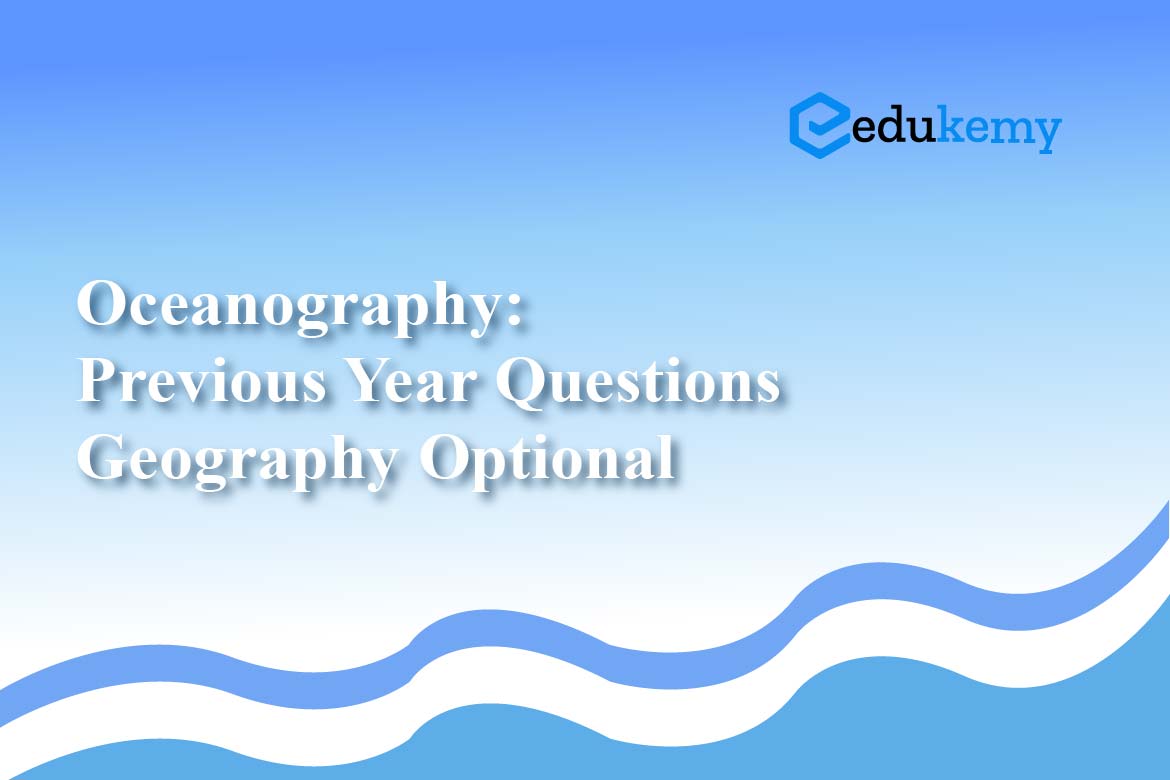
Oceanography is one of the important sections of Geography Optional for the UPSC Civil Services Mains Examination. Outlined below are the various questions asked in the UPSC Mains from Climatology.
Complete Syllabus for Geography Optional for UPSC CSE
Get the Geography Optional Hard Copy Notes of Shabbir Sir’s most recent batch: Here
Contents
Oceanography Previous Year Questions (UPSC CSE Mains Geography Optional)
- When corals are affected by stress it causes them to turn completely white. Explain the reasons of such
an occurrence. (10 Marks/2022) - What is the relationship between ocean currents and global surface wind systems? Explain with examples
how does the gyre in the Northern Hemisphere differ from the one in the Southern Hemisphere.
(15 Marks/2022) - Discuss the hazards hazards associated with rise of sea-surface temperature. (10 Marks/2021)
- Give a detailed account of bottom topography of the Pacific Ocean. (15 Marks/2021)
- Maritime security is neglected. Indicate the major challenges and suggest solutions in the context of Law
of the Sea. (15 Marks/2021) - Marine resources are economically very significant. Discuss citing suitable examples. (10 Marks/2020)
- Discuss the concept of coral bleaching, its recovery and macroalgal regime shifts due to ths process.
(15 Marks/2020) - Explain the currents of the North Atlantic Ocean and their significant role in the climate of Western
Europe. (15 Marks/2020) - How are ocean waves formed? Distinguish between a wave of oscillation and a wave of translation.
(15 Marks/2019) - Describe the causes and consequences of sea level changes. (10 Marks/2018)
- Describe the potential marine energy resources with reference to their benefits, harvestability and
environmental impacts. (20 Marks/2018) - Distinguish between low energy coasts and coral coasts. (10 Marks/2017)
- Discuss the impacts of ocean currents on air mass behaviour. (10 Marks/2017)
- Explain the concept of micro carbon sink and its relevance. (10 Marks/2017)
- Describe the configuration of the Pacific Ocean floor. (15 Marks/2017)
- Discuss Maritime Zones. (10 Marks/2016)
- “The relationship between the winds and the currents is best seen in the Indian Ocean.” Justify.
(15 Marks/2016) - Bring out the various ecological problems associated with the exploitation and use of oceans and their
resources. (20 Marks/2016) - Describe the characteristics of different types of pelagic deposits. (10 Marks/2015)
- Illustrate the origin and nature of Sargasso Sea and Lagoon. (10 Marks/2014)
- Give a critical account of reasons and consequences of marine pollution. (15 Marks/2014)
- Give an account of recent observations on coral bleaching with reference to Clive Wilkinson’s Report.
(15 Marks/2014) - What is “Base level”? Explain the types of base level. (15 Marks/2013)
- “Offshore Acoustic Study helped the development of the concept of sea floor spreading”. Explain.
(20 Marks/2013) - Compare the Subsidence and Glacial control theories on the formation of coral reefs. (25 Marks/2013)
Frequently Asked Questions (FAQs)
Q: What is oceanography?
A: Oceanography is the scientific study of the ocean, encompassing various disciplines such as marine biology, geology, chemistry, and physics. It aims to understand the physical, chemical, biological, and geological characteristics of the world’s oceans and seas.
Q: Why is oceanography important?
A: Oceanography is crucial for several reasons. It helps us understand climate patterns, marine life ecosystems, and the impact of human activities on the oceans. Additionally, it plays a key role in predicting and managing natural disasters like tsunamis and hurricanes, as well as in the exploration of marine resources.
Q: How do oceanographers collect data?
A: Oceanographers use a variety of methods to collect data. These include satellite observations, remotely operated vehicles (ROVs), autonomous underwater vehicles (AUVs), buoys, and traditional ship-based sampling. These tools allow scientists to study different aspects of the ocean, from surface temperature to deep-sea ecosystems.
Q: What role does oceanography play in climate change research?
A: Oceanography is fundamental to climate change research because the oceans play a critical role in regulating the Earth’s climate. Oceans absorb and release heat, influence weather patterns, and store vast amounts of carbon dioxide. Studying ocean dynamics helps scientists understand how climate change affects the oceans and vice versa.
Q; How are oceanographers addressing marine pollution?
A: Oceanographers actively contribute to addressing marine pollution by studying its sources, distribution, and impact on marine ecosystems. Their research informs policies aimed at mitigating pollution, and they develop strategies for sustainable resource management. Understanding the extent of marine pollution is essential for preserving the health of our oceans and the life they support.
In case you still have your doubts, contact us on 9811333901.
For UPSC Prelims Resources, Click here
For Daily Updates and Study Material:
Join our Telegram Channel – Edukemy for IAS
- 1. Learn through Videos – here
- 2. Be Exam Ready by Practicing Daily MCQs – here
- 3. Daily Newsletter – Get all your Current Affairs Covered – here
- 4. Mains Answer Writing Practice – here

